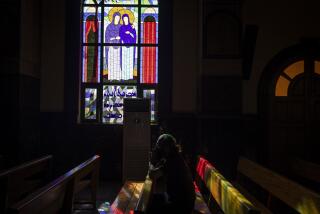Fighting ramps up in Sudan border regions
Reporting from Cairo and Khartoum, Sudan â Fears of another civil war are playing out in Sudan as troops led by President Omar Hassan Ahmed Bashir have overrun towns and attacked tribesmen loyal to the south around a contested border region of oil reserves and well-armed militias.
Bloodshed and streams of refugees are a dangerous prelude to July 9, when southern Sudan, after decades of conflict that left more than 2 million dead, gains independence. The south will inherit the bulk of the nationâs oil supplies and the incursions by northern forces appear to be part of Bashirâs strategy to press the south for last-minute concessions.
The northâs economy is struggling and Bashir, wanted by the International Criminal Court on charges of war crimes in Sudanâs Darfur region, is loath to let billions of dollars in oil revenue slip away. U.S. and other Western officials worry, however, that Khartoumâs attacks along the border and in a neighboring northern state could tip the country into war and upset a volatile stretch of East Africa.
Northern troops and tanks captured the contested Abyei border region last month, forcing tens of thousands of civilians to flee their homes. Holding Abyei would give Bashir a larger share of oil or allow him to negotiate money from the south in return for withdrawing his soldiers. The north and south have yet to agree on boundaries or a formula to share oil revenue.
The northern-controlled oil state of South Kordofan has also turned volatile. The state is filled with militants who battled the north in the civil war that ended with a 2005 peace agreement. Bashir sent his army into the area last week when tension rose after a northern-backed candidate, who was also wanted by the International Criminal Court, was elected governor.
The United Nations says fighting between southern and northern elements has forced at least 40,000 people to flee Southern Kordofanâs capital, Kadugli. The north claims the Southern Peopleâs Liberation Movement, or SPLM, which runs the southern government, is instigating trouble. The south contends the north has invented that pretext to harden its grip across the Nuba Mountains and increase pressure on the border.
âThe government in Khartoum seems to have taken a more belligerent and proactive military approach to the situation, perhaps thinking this gives them some advantages in the negotiations, first by the military takeover in Abyei and then by sending forces into South Kordofan,â said Princeton N. Lyman, U.S. envoy to Sudan, in an interview with Voice of America. âIâm not sure why the government chose in the last few weeks to turn to this kind of a policy, but it is very, very threatening to the whole negotiating process.â
Bashir and SPLM President Salva Kiir met Sunday for talks in Ethiopia, with the Sudanese media reporting that Bashir has agreed to pull back his troops from Abyei before July 9 and replace them with Ethiopian peacekeepers under the United Nations flag. The report could not be independently confirmed. Bashir has reneged on previous promises.
In Southern Kordofan, the Bashir government denied reports by an SPLM spokesman that the south had shot down two northern warplanes amid heavy fighting. Khartoum has indicated it will not back down until militants loyal to the south are disarmed and routed.
â
The southern-backed fighters in Southern Kordofan âare not that strong,â said Abdullah Rizig, a Sudanese political analyst. âBut if they get money and weapons they could be very annoying to the central government. They would be like the rebels in Darfur, not powerful but difficult to get rid of.â
The unrest is a setback for Washington. The Obama administration has offered to lift economic sanctions and remove Sudan from the list of terrorist states if Bashir allows a peaceful separation between the mostly Muslim north and the predominantly animist and Christian south. Bashir had wanted such assurances to strengthen his power at a time when he was facing indictments for alleged war crimes in Darfur while his economy, heavily reliant on southern oil, was faltering.
The Sudanese leader appeared to keep his promise in January when the south voted overwhelmingly for independence in a referendum. There was sporadic fighting in the Abyei region, but overall the vote passed with little bloodshed. With independence for the south only weeks away, however, Bashir has ignored international condemnation to improve his bargaining hand.
The south generates about 75% of Sudanâs output of 500,000 barrels of oil a day. But it needs the northâs pipelines to reach shipping ports on the Red Sea. The south is considering building a pipeline through Kenya that would circumvent Bashirâs north and leave his ruling National Congress Party, or NCP, without billions of dollars in revenue.
International attention shifted away from Sudan during the recent revolts across the Arab world. But the split between north and south and other conflicts across Africaâs largest country are worrisome. Rebels in Darfur have been battling government-backed forces for years and secessionist stirrings in Blue Nile and other states could further isolate Bashir, who insists on establishing a conservative Islamic state in the north.
âBashir is trying to show others that he will be in charge of the rest of the country after the south secedes,â said Rizig. âThe NCP wants to dominate the whole north because it fears other regions will call for self-determination. Bashir said he will impose Islamic Sharia law when the south goes. This means going backward to the early days when his regime came to power.â
Times staff writer Fleishman reported from Cairo and special correspondent Ahmed from Khartoum.
More to Read
Sign up for The Wild
Weâll help you find the best places to hike, bike and run, as well as the perfect silent spots for meditation and yoga.
You may occasionally receive promotional content from the Los Angeles Times.







